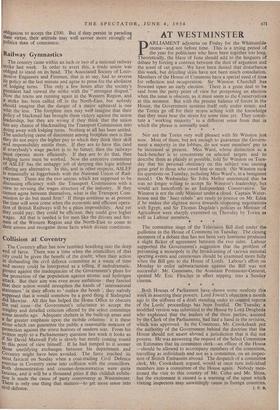AT WESTMINSTER ARLIAMENT adjourns on Friday for the Whitsuntide
p
recess—and not before time. This is a trying period of the year for politicians who have been together too long. Theoretically, the blaze of June should add to the languors of debate by forcing a contrast between the dust of argument and the scent of cut grass. We have been denied that disturbance this week, but drizzling skies have not been much consolation. Members of the House of Commons have a special need of time for reflection and recuperation. Sir Winston Churchill has frowned upon an early election. There is a great deal to be said from the party point of view for postponing an election when the issue is obscure, as it must seem to the Conservatives at this moment. But with the present balance of forces in the House, the Government sustains itself only under strain; and the Tories go off for their recess aching with the knowledge that they must bear the strain for some time yet. They consti- tute a working majority' in a different sense from that in which the phrase is normally used. * * * Nor are the Tories very well pleased with Sir Winston just now. Most of them, but not enough to guarantee the Govern- ment a majority in the lobbies, do not want members' pay to be increased at present. Miss Ward, whose distinction as a back-bencher is to concentrate on selected targets and to describe them as plainly as possible, told Sir Winston on Tues- day that his personal obstinacy on this subject was causing great grief to those who owed him so much. (Sir Winston took his questions on Tuesday, including Miss Ward's, in a benignant mood.) On Wednesday Sir John Mellor announced that he was no longer willing to accept Sir Winston's leadership, but would act henceforth as an Independent Conservative. Sir Winston is not the only Minister under a cloud. Captain Water- house and the ' Suez rebels ' are ready to pounce on Mr. Eden if he makes the slightest move towards reopening negotiations with Egypt; and Sir Thomas Dugdale's policies as Minister of Agriculture were sharply examined on Thursday by Tories as well as Labour members. * * * The committee stage of the Television Bill died under the guillotine in the House of Commons on Tuesday. The closing moments of a debate that has not been very luminous produced a slight flicker of agreement between the two sides. Labour supported the Government's suggestion that the problem of preventing a monopoly in the broadcasting of various national sporting events and ceremonies should be examined more fully when the Bill gets to the House of Lords. Labour's effort on Monday to enlist sabbatarianism against the Bill was not successful: Mr. Gammans, the Assistant Postmaster-General. spotted Mr. Eric Fletcher in effect nipping into a Sunday cinema.
* * * Both Houses of Parliament have , shown sonic modesty this week in asserting their powers. Lord Jowitt's objection a month ago to the stiffness of a draft standing order to control reports of the Lords' proceedings has been fruitful. On Tuesday a modified version was submitted to the House by Lord Drogheda who explained that the leaders of the three parties, assisted by the Clerk of the Parliaments, had had a hand in the revision, which was approved. In the Commons, Mr. Crookshank put the authority of the Government behind the doctrine that the House should not assert abroad a jurisdiction that it did not possess. He was answering the request of the Select Committee on Estimates that its committee clerk—an officer of the House —should be allowed to accompany members of the committee. travelling as individuals and not as a committee, on an inspec- tion of British Embassies abroad. The despatch of a committee clerk, Mr. Crookshank argued, would at once turn individual members into a committee of the House again. Nobody men- tioned the visit to this country of Mr. Cohn and Mr. Shine. but the excitement it caused is a warning of the upset which visiting inspectors may unwittingly cause in foreign countries.


































 Previous page
Previous page